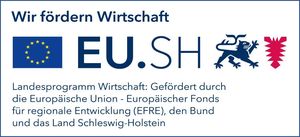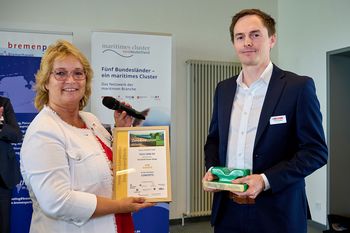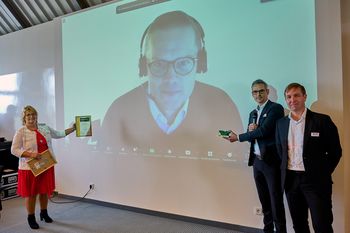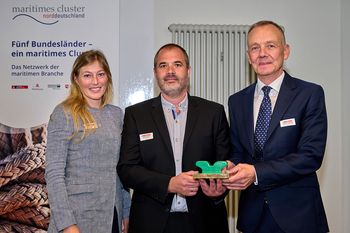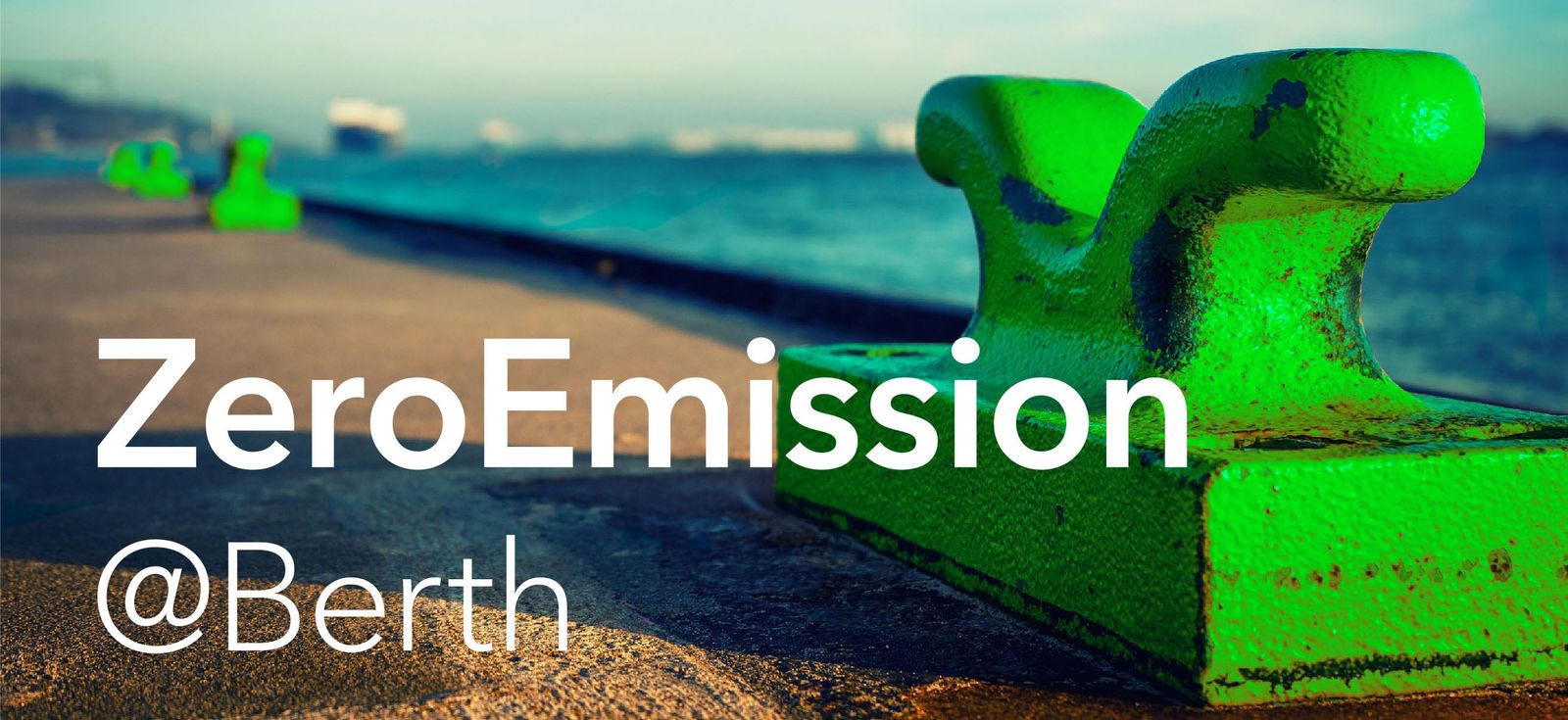
The ZeroEmisson@Berth project
Activities in the port as well as in shipping operations have an impact on air quality and the climate. Through the use of sulphurous, fossil-based marine diesel both in regular ship operation and for power generation during berthing, ships currently still contribute significantly to air pollutant and carbon dioxide emissions in and around the port. In spring 2021, representatives of nine German seaports came together to make a proactive contribution to the EU's "Green Deal", i.e. decarbonisation and air pollution control. The project "ZeroEmission@Berth" was launched and implemented by the ports of Wismar, Rostock, Kiel, Lübeck, Brunsbüttel, Hamburg, Bremen and Niedersachsen Ports and the Maritime Cluster Norddeutschland e.V. as cooperation partner.
Memorandum of Understanding
In a first step, the nine seaports signed a Memorandum of Understanding in May 2021. In addition to the goals of the joint project, various work packages were described and defined.
An important goal of the project was to identify technology-open alternatives to ensure an external on-board power supply at berth and, at best, the operation of ships without the use of fossil fuels. With a view to the sustainable and thus emission-free operation of ships that is to be strived for, special-purpose solutions for the short in-port berthing times in relation to the journey time represent bridge solutions at best. To this end, companies, developers, researchers and all interested parties were called upon to participate in an innovation competition and submit concepts and technical solutions for sustainable ship operation - especially at berth - to the Maritime Cluster Northern Germany.
In anticipation of the results of the innovation competition, the ports agreed to contribute technical expertise as best they could during the process, to examine the proposals submitted for their feasibility and, if possible, to implement pilots in the respective port locations in order to achieve the broadest possible impact and learning effect.
Position paper
In order to clarify the content of the seaports' position, the cooperation partners drew up a joint position paper (in German). The paper was published in December 2021 as part of a press release. In addition to the aforementioned technological openness in the generation of on-board electricity, the paper calls for all ships to reduce emissions, regardless of ship type and size, and for the costs of reducing emissions to be borne by the polluters, i.e. the ship operators themselves. In addition, the German seaports are positioning themselves for the introduction of a European CO² emissions limit for all seagoing and inland vessels at berth.
The Innovation Competition
The innovation competition was organised and carried out by the Maritime Cluster Northern Germany. Solutions were sought that could contribute quickly and significantly to reducing emissions at berth. The aim was to present innovative ideas, concepts and existing technology-neutral approaches to supplying ships with energy at berth, as well as solutions that ideally also contribute to reducing emissions when the ship is at sea. The project participants had agreed to look for innovations in three categories in order to specifically address innovations that have different degrees of maturity: Concepts, Prototypes and Existing Solutions. In the concepts category, conceptual descriptions were sought for alternative energy supply approaches for ships at berth that are still at an R&D stage, but which can demonstrate the potential for innovation. Ideas that demonstrate technical feasibility but lack development steps (e.g. economic feasibility studies or further system developments) were assigned to the prototype category. Market-ready solutions that are already being used successfully in other ports or on board and are available, but still need to be adapted and/or scaled up, were consequently categorised as existing solutions. The internationally announced competition started on 1 February 2022 and ran until 18 June 2022. A total of 30 applications from 14 countries were submitted.The submissions were evaluated by a jury of experts based on the criteria stated in the call for entries. The seven-member expert jury appointed by the ports consisted of representatives of associations, shipping companies and academia.
The winners received their awards on 29 September 2022 during the specialist event "Sustainable ports: together, clear, clean" at the German Shipping Day in Bremen. An overview of the winners can be found further down on this website.
Outlook & Next Steps
The port representatives evaluate the submitted innovations for possible implementation in their port and whether there are any synergies between the participants that can be used.
Topic-based events, the exchange of best practice examples and the bringing together of stakeholders in the port are already taking place in many networks. The network of the Maritime Cluster Northern Germany and the e4Ports network, the national organisation for hydrogen and fuel cell technology, should be mentioned here. These forums also show instruments for promoting alternative energy supplies. Some of the project partners of the ZeroEmission@Berth project are partners or members of the mentioned networks. The nine ports will continue to participate in decarbonisation projects with the aim of operating ships in the ports in a climate-neutral manner, reducing air pollutants in the port and port environment and thus making an important contribution to climate-neutral port operations.
The winners
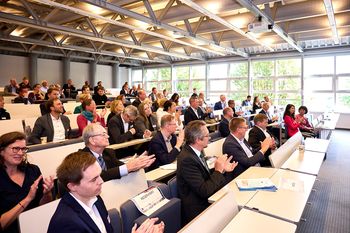
The award ceremony took place as part of the German Shipping Day 2022 during the event “Sustainable Ports – Together, Clear, Clean” on 29 September at Bremen University of Applied Sciences. In total, 30 submissions were received from companies from 14 countries. "The diverse approaches from all parts of the world surprised even the jury members and prove that technology providers are serious about decarbonisation in the maritime industry," said Peter Moller, MCN Branch Manager.
The Maritime Cluster Northern Germany would like to thank all participants in the competition, the jury, the initiators of the ZeroEmission@Berth innovation competition and all visitors who attended the award ceremony.
Category A: Concepts
In Category A: Concepts, the award went to the Norwegian company TECO 2030 AS. With its Power Barge based on fuel cell technology, the company aims to bring to market a mobile, floating zero-emission power supply for ships at berth or at anchor. “A key aspect is that we look holistically at ports and the general conditions there for using our technology,” emphasised Fredrik Aarskog, the company’s Business Development Manager – Hydrogen Technology, at the award ceremony. Moreover, the system is not only suitable for use in ports or at anchor, but also for ships in motion.
Category B: Prototypes
The winner in Category B: Prototypes is CMB Germany GmbH & Co. KG, a subsidiary of the Belgian CMB Group. CMB has developed dual-fuel and mono-fuel applications for the emission-free and emission-reduced onshore power supply of ships at berth. “What’s innovative is that you can continue to use an existing technology – the diesel engine, but convert it to hydrogen,” explains Benjamin Weinacht, Managing Director of CMB Germany. “We’re taking into account the fact that hydrogen is not yet immediately available everywhere, as the engines can continue to generate electricity with diesel during the transition phase.”
Category C: Existing Solutions
The winners in Category C: Existing Solutions are the Danish companies Ballard Power Systems Europe and CS electric A/S. Their jointly developed and already certified product, FCwaveTM, supplies ships with emission-free energy from hydrogen. The fuel cells can be installed in 20-foot containers and, thanks to their very low noise level, are also highly suited for port environments. “Our approach was to use an existing zero-emission technology in a new environment – ports, which are looking to become more environmentally friendly in future,” says Thomas T. Petersen, Product Line Manager Marine at Ballard. “The solution has great potential, also because it can be scaled up quickly,” adds Gert Andersen, Senior Sales Manager at CS electric.
The nominees
Category A: Concepts
ABB OY (Finland), Hydrogen de France (France), Teco 2030 AS (Norway)
Category B: Prototypes
CMB Germany (Germany), Navtek Naval Technologies (Turkey), Teco 2030 AS (Norway)
Category C: Existing solutions
Ballard Power Systems & CS Electric (Denmark), DK Tankers (Singapore), e-Cap Marine (Germany), Hydrogen de France (France), Navtek Naval Technologies (Turkey)
The nominees have been named in alphabetical order.
The initiators
The initiators of the project ‚ZeroEmission@Berth‘ are the port infrastructure companies of the herewith mentioned German seaports. With their joint position paper on ‚ZeroEmission@Berth‘, they are positioning themselves for a level playing field, for a technology-neutral approach and for the Polluter Pays Principle.
Link to the position paper on ‚ZeroEmission@Berth‘

